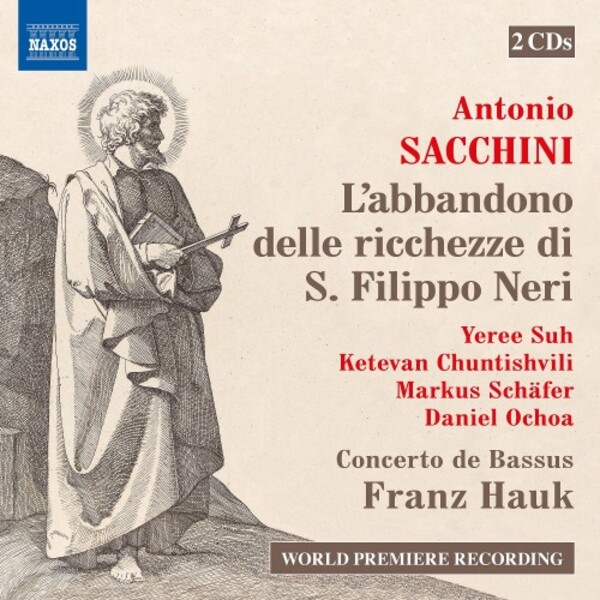SACCHINI L'abbandono delle ricchezze di S. Filippo Neri
View record and artist detailsRecord and Artist Details
Genre:
Vocal
Label: Naxos
Magazine Review Date: 01/2024
Media Format: CD or Download
Media Runtime: 116
Mastering:
DDD
Catalogue Number: 8 574526-27

Tracks:
| Composition | Artist Credit |
|---|---|
| L'abbandono delle richezze di S. Filippo Neri |
Antonio Sacchini, Composer
Concerto de Bassus Daniel Ochoa, Bass Franz Hauk, Conductor Giovanni Michelini, Organ Ketevan Chuntishvili, Soprano Markus Schäfer, Tenor Yeree Suh, Soprano |
Author: Peter Quantrill
Born in 1730, Antonio Sacchini was a full generation older than Mozart, but his sacred drama written for Lent in 1765 irresistibly invites comparison with the music contributed two years later by the 11-year-old prodigy to a similar project. In Die Schuldigkeit des ersten Gebots, K35, an unnamed Christian is guided along and tempted from the path of righteousness by embodiments of virtues and vices.
Sacchini also sets a recitative-heavy text, unpromisingly sententious to any reader curious enough to investigate the Italian text on the Naxos website or its German-only translation. His hero, however, is the very real historical figure of St Philip Neri (1515 95), founder of the Congregation of the Oratory, and thus for whom slightly strenuous claims are made in the scholarly booklet essay as ‘father of the oratorio’. The work’s two parts trace his ‘renunciation of all worldly wealth’ through a recitative-aria sequence broken only at the end of the first part by a duet for the Saint and the spirit of Poverty, also a soprano.
Major-key pieties prevail: Sacchini is in the business of fitting out ‘suits for singers’, in Roger Norrington’s memorable phrase about the early Mozart operas, and he does so with a string of fluent, occasionally memorable melodies. Anyone attracted by recent Decca albums of Nicola Porpora led by Max Emanuel Cenčić such as Germanico in Germania (4/18) will find themselves at home here, and the vocal performances are of a similarly high order.
As Poverty, Ketevan Chuntishvili negotiates an eight-minute showpiece in part 1, obbligato horns to the fore, with a vibrantly coloured soprano, even across her registers and equipped with all the necessary agility for florid ornamentation. Once a fixture with Sigiswald Kuijken’s La Petite Bande, Markus Schäfer sings with a sure grasp of style, though now also a dryness of timbre that does not immediately suggest itself as the personification of Splendour.
Despite some struggles with the lower compass of the role, Daniel Ochoa fulminates convincingly as Deception, largely confined to outbursts of rage and frustration at Philip’s saintly conduct. There is all too little for Yeree Suh to sing in the title-role, but she makes each of her three arias a highlight with tingling coloratura and the best feel for the text among the cast. Franz Hauk’s direction is rhythmically strong, occasionally over-emphatic, but time never hangs heavy as Philip ascends the path to sainthood.
Discover the world's largest classical music catalogue with Presto Music.

Gramophone Digital Club
- Digital Edition
- Digital Archive
- Reviews Database
- Full website access
From £8.75 / month
Subscribe
Gramophone Full Club
- Print Edition
- Digital Edition
- Digital Archive
- Reviews Database
- Full website access
From £11.00 / month
Subscribe
If you are a library, university or other organisation that would be interested in an institutional subscription to Gramophone please click here for further information.




